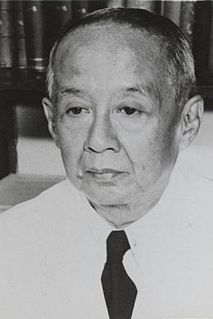
The Jakarta Special Capital Region is administratively equal to a province with special status as the capital of Indonesia. Instead of a mayor, the executive head of Jakarta is a governor. The governor of Jakarta is an elected politician who, along with the vice governor and 106 members of the Regional People's Representative Council (DPRD), is accountable for the strategic government of the city of Jakarta.

The State of Pasundan was a federal state (negara bagian) formed in the western part of the Indonesian island of Java by the Netherlands in 1948 following the Linggadjati Agreement. It was similar to the geographical area now encompassed by the current provinces of West Java, Banten and Jakarta.

Raden Aria Adipati Wiranatakusumah V, commonly shortened to R. A. A. Wiranatakusumah V or just as Wiranatakusumah V, was an Indonesian politician who served as the first and only Wali Negara of Pasundan, during the Indonesian National Revolution. He was also the first Minister of Home Affairs of Indonesia and the second Chairman of the Supreme Advisory Council.
The Djajadiningrat family was a high-ranking priyayi family in colonial Indonesia, whose members often served as Bupati or Regents of Serang in Banten, Dutch East Indies. Noted for their western outlook and loyalty to the Dutch authorities during the colonial period, the family nonetheless fought on both sides of the Indonesian National Revolution (1945–1949).

The People's Representative Council of the United States of Indonesia was one of the two national legislative assemblies in the United States of Indonesia (RUSI). The council was formed after the establishment of the Indonesian federal state. It consisted of 150 members.

The Supreme Advisory Council, is a defunct advisory council for the President of Indonesia. Its function was to give advice on state and foreign affairs.

The Adil Cabinet was the first cabinet established by the State of Pasundan following the formation of the state on 28 April 1948. It was composed of eight ministers and one official. Its term of office ran from 8 May 1948 to 10 January 1949.

The Third Djumhana Cabinet was the fourth cabinet established by the State of Pasundan. It was composed of nine ministers and one official. Its term of office ran from 18 July 1949 to 11 January 1950.

The Anwar Cabinet was the fifth cabinet established by the State of Pasundan. It was composed of 11 ministers. Its term of office ran from 11 to 23 January 1950.

The First Djumhana Cabinet was the second cabinet established by the State of Pasundan. It was composed of nine ministers and one official. Its term of office ran from 10 to 31 January 1949.

The Prime Minister of Pasundan was the head of government and the highest political office in the short-lived State of Pasundan (1948-1950). Appointed by the Wali Negara of Pasundan from among influential Members of Parliament, the Prime Minister was responsible to the Parliament, and his cabinet could be dismissed by a vote of no confidence.

Hilman Djajadiningrat was an Indonesian aristocrat and politician.

Djumhana Wiriaatmadja was a Sundanese aristocrat, regent, politician, and diplomat.

The Ministry of Home Affairs was a government ministry of the State of Pasundan. The ministry was responsible for the control of the state apparatus, civil service, and the Pasundan Police Department.

The Ministry of Justice was a government ministry of the State of Pasundan. The ministry was responsible for the justice system, penitentiary system, publishing of government gazette, dactyloscopy, and beachcombing in the State of Pasundan.

The Ministry of Education and Religious Affairs was a government ministry of the State of Pasundan. The ministry was responsible for the schools, university, and religious matters in the State of Pasundan.

The Ministry of Health was a government ministry of the State of Pasundan. The ministry was responsible for the health system, vaccination programs, hospitals, and clinics in the State of Pasundan.

Husein Jayadiningrat, or Hoesein Djajadiningrat in older spelling, was an Indonesian scholar in Indonesian studies, Islamic law, and native Indonesian literature. He distinguished himself as one of the first native Indonesian to earn a doctoral degree.

Mohammad Enoch was an Indonesian politician and engineer. He briefly served as Minister of Public Works during the First Amir Sjarifuddin Cabinet prior to his resignation, and also briefly as mayor of Yogyakarta before that.














